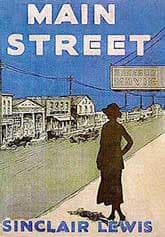Main Street
 First edition
First editionFirst book publication
1920, United States
Literature form
Novel
Genres
Literary
Writing language
English
Author's country
United States
Length
approx. 168,000 words
Notable lines
This is America—a town of a few thousand, in a region of wheat and corn and dairies and little groves.
— First lines, prologue
On a hill by the Mississippi where Chippewas camped two generations ago, a girl stood in relief against the cornflower blue of Northern sky. She saw no Indians now; she saw flour-mills and the blinking windows of skyscrapers in Minneapolis and St. Paul.
— First lines, Chapter I
He flung out his hand in a welcoming gesture which assumed that she was her own counselor, that she was not a Respectable Married Woman but fully a human being.
She was a woman with a working brain and no work.
There were only three things which she could do: Have children; start her career of reforming; or become so definitely a part of the town that she would be fulfilled by the activities of church and study-club and bridge-parties.
I think perhaps we want a more conscious life. We're tired of drudging and sleeping and dying. We're tired of seeing just a few people able to be individualists. We're tired of always deferring hope till the next generation. We're tired of hearing politicians and priests and cautious reformers... coax us, 'Be calm! Be patient! Just give us a bit more time and we'll produce it; trust us; we're wiser than you!' For ten thousand years they've said that. We want our Utopia now— and we're going to try our hands at it.
It has not yet been recorded that any human being has gained a very large or permanent contentment from meditation upon the fact that he is better off than others.
She had her freedom, and it was empty. The moment was not the highest of her life, but the lowest and most desolate, which was altogether excellent, for instead of slipping downward she began to climb.
It is contentment...the contentment of the quiet dead, who are scornful of the living for their restless walking. It is negation canonized as the one positive virtue. It is the prohibition of happiness. It is slavery self-sought and self-defended. It is dullness made God.
To Carol was given a sudden great philosophical understanding, an explanation of half the cautious reforms in history. "Yes. I've heard that plea. It's a good one. It sets revolts aside to cool. It keeps strays in the flock. To word it differently: 'You must live up to the popular code if you believe in it; but if you don't believe in it, then you MUST live up to it!'"
She patted his pillows, turned down his sheets, as she reflected:
"But I have won in this: I've never excused my failures by sneering at my aspirations, by pretending to have gone beyond them. I do not admit that Main Street is as beautiful as it should be! I do not admit that Gopher Prairie is greater or more generous than Europe! I do not admit that dish-washing is enough to satisfy all women! I may not have fought the good fight, but I have kept the faith."
"Sure. You bet you have," said Kennicott. "Well, good night. Sort of feels to me like it might snow tomorrow. Have to be thinking about putting up the storm-windows pretty soon. Say, did you notice whether the girl put that screwdriver back?"
— Last lines

